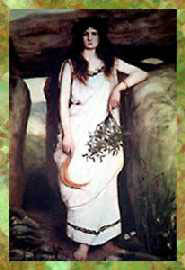
Faith
The religious faith of ancient Celtic inhabitants of Gaul and the British Isles from the 2nd century BCE until the 2nd century CE. In parts of Britain that the Romans did not invade, Druidism survived until it was supplanted by Christianity two or three centuries later. This religion included belief in the immortality of the soul, which at death was believed to pass into the body of a newborn child. According to Julius Caesar, drawing on a biased account of the cult written by Posidonius, a Stoic philosopher and historian, the Druids believed that they were descended from a supreme being.
 The ancient accounts assert that the functions of priests, religious teachers, judges, and civil administrators were performed by Druids, with supreme power being vested in an archdruid. Three classes of Druids existed: prophets, bards, and priests. They were assisted by female prophets or sorcerers, who did not enjoy the powers and privileges of the Druids. The Druids were well versed in astrology, magic, and the mysterious powers of plants and animals; they held the oak tree and the mistletoe, especially when the latter grew on oak trees, in great reverence, and they customarily conducted their rituals in oak forests. Archaeologists believe that the Druids probably used as altars and temples the stone monuments known as dolmens that are found throughout the areas where Druidism flourished. Stonehenge in England antedates Druidism by many centuries. The ancient accounts assert that the functions of priests, religious teachers, judges, and civil administrators were performed by Druids, with supreme power being vested in an archdruid. Three classes of Druids existed: prophets, bards, and priests. They were assisted by female prophets or sorcerers, who did not enjoy the powers and privileges of the Druids. The Druids were well versed in astrology, magic, and the mysterious powers of plants and animals; they held the oak tree and the mistletoe, especially when the latter grew on oak trees, in great reverence, and they customarily conducted their rituals in oak forests. Archaeologists believe that the Druids probably used as altars and temples the stone monuments known as dolmens that are found throughout the areas where Druidism flourished. Stonehenge in England antedates Druidism by many centuries.
The Druids led their people in resisting the Roman invasions, but their power was weakened by the rebelliousness of the Gallic warriors, who were envious of their political authority. The superior military strength of the Romans and the subsequent conversion of many followers of Druidism to Christianity led to the disappearance of the religion.
Roman Occupation
|







